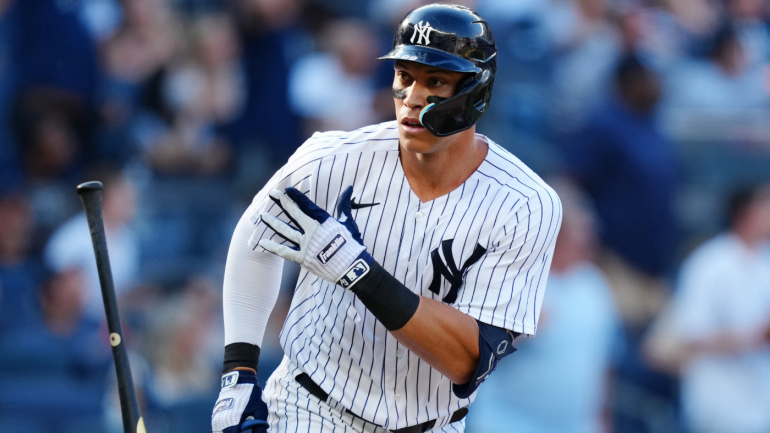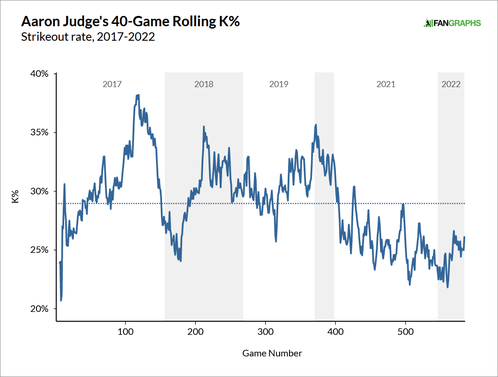
At 29-13, the New York Yankees own the best record in baseball, and that's even after losing their last three games. The Yankees scored one run in Sunday's doubleheader sweep against the Chicago Sox. It was the first time they scored no more than one run a doubleheader since Sept. 2014, and the first time at home since Aug. 1991.
The Yankees have scored five runs during the three-game losing streak and all five came on Aaron Judge homers. He took ChiSox setup man Kendall Graveman deep Sunday, then got Baltimore Orioles righty Jordan Lyles twice on Monday. Judge leads MLB with 17 homers (no one else has no more than 12) and, overall, he's hitting .325/.398/.715 while playing plenty of center field (13 starts) in addition to right (21 starts).
"Sometimes I take him for granted, I think. But not right now. He's really carrying us offensively," Yankees manager Aaron Boone told the New York Post following Judge's two-homer effort Monday.
Before the season Judge somewhat surprisingly rejected a seven-year, $213.5 million contract extension that would have taken him through 2029, his age-37 season. It certainly wasn't an unreasonable offer, but Judge deemed it too light, so he's betting on himself and playing out the season. And so far, it could not be going better for him. He's been awesome.
Judge declining the extension put the Yankees in an awkward position in which they're rooting for Judge to perform well so he helps them win the World Series while also knowing the better Judge performs, the more he's going to cost. In the end, these are the Yankees and they can pay anything, but no one likes seeing the price going up, and Judge's price is going up.
Here are three ways Judge has increased his value to the Yankees -- and thus increased his earning potential as he approaches free agency -- early on this season.
1. The heightened value of power
For several reasons (deadened baseballs, the universal humidor, etc.), it is harder to hit home runs now than in years past. You wouldn't know that from watching Judge, who leads the majors with 17 home runs and has gone deep 16 times in his last 27 games. Overall though, the league-wide home run rate is way down in 2022, as Rob Manfred & Co. intended.
If home runs are harder to hit, then home runs become much more valuable. Judge's ability to hit the baseball hard is nearly unmatched in the game today. He's not a product of Yankee Stadium's friendly confines -- Judge's home runs average a healthy 409 feet this year (the MLB average is 399 feet) -- he's a product of hitting the ever-loving crap out of the ball.
Here are a few contact quality leaderboards since Opening Day 2021 (min. 400 batted balls):
| Average exit velocity | Hard-hit rate (i.e. batted balls over 95 mph) | Barrel rate (what's a barrel?) |
|---|---|---|
1. Aaron Judge: 96.0 mph | 1. Aaron Judge: 59.0% | 1. Shohei Ohtani: 20.1% |
2. Giancarlo Stanton: 95.6 mph | 2. Yordan Alvarez: 55.9% | 2. Aaron Judge: 19.5% |
3. Vladimir Guerrero Jr.: 94.7 mph | 3. Giancarlo Stanton: 55.9% | 3. Giancarlo Stanton: 17.6% |
4. Yordan Alvarez: 93.6 mph | 4. Miguel Sanó: 55.3% | 4. Bryce Harper: 17.6% |
5. Josh Donaldson: 93.6 mph | 5. Vladimir Guerrero Jr.: 54.8% | 5. Bobby Dalbec: 17.5% |
MLB average: 88.8 mph | MLB average: 38.7% | MLB average: 7.8% |
Notice how several Yankees appear on those leaderboards (drop the minimum to 300 batted balls and Joey Gallo would pop up there as well)? That's because they lean heavily on exit velocity and hard-hit ability as an evaluation tool. If Judge were with another team and set to become a free agent this winter, the Yankees would be salivating at the possibility of signing him.
Judge is not a one-trick pony. Since his rookie season he ranks 17th among all hitters in batting average and fourth in on-base percentage, and third among outfielders in defensive runs saved. He is a complete, all-around player. Power is his calling card though. Home runs are the single best thing a hitter can do in any given at-bat and almost no one in baseball is as good at hitting home runs as Judge is right now.
We have no idea how the baseball will play from one season to the next, and sometimes even one month to the next. That makes undeniable power, the power that plays in any park with any type of baseball, much more valuable, and Judge has it. He's always had it, and he's shown he can be successful with several different baseballs in his career. That makes him a pretty safe bet moving forward. Teams don't have to worry about a deadened ball sapping his production the way they do some others.
2. A decline in strikeouts
Judge is a big man with long levers who has always struck out and swung and missed a bunch. The strikeouts are the trade off for the power. That said, Judge has cut his strikeout and swinging strike rates considerably the last few seasons, so much so that his 11.1 percent swinging strike rate since Opening Day 2021 is (technically!) lower than the MLB average (11.2 percent).
Here is Judge's strikeout rate over the years. A graph is worth a thousand words:

Never in his career has Judge swung and miss as infrequently as he is right now, and when Judge makes contact, good things tend to happen because he hits the ball so incredibly hard. The question was always whether he'd made enough contact for his natural power to play in games consistently. He has and it does, now moreso than ever. There are fewer exploitable holes in his swing.
The story of Judge's career -- this dates back to his time at Fresno State and all through the minors -- is being promoted to a new level, going through an adjustment period, then dominating. He struggled greatly during his 2016 debut before having a historic rookie season in 2017, and now he's had a long runway to continue adjusting to MLB pitching. The result is the lowest strikeout rate of his career.
3. What about the injuries?
Judge's injury history is lengthy and it predates his breakout as an MLB star in 2017. It's easiest just to list the injuries by year:
- 2016: Missed 24 days with a knee sprain in Triple-A and 19 days with an oblique strain after being called up to MLB.
- 2017: Played through a shoulder issue in the second half and had surgery after the season.
- 2018: Missed 49 days with a broken wrist after being hit by a pitch.
- 2019: Missed 61 days with an oblique strain. Also broke a rib diving for a ball in September, but played through it in the postseason.
- 2020: Missed 30 days total with calf strains (two injured list stints).
It's an awful lot of injuries. Judge played only 242 of 382 possible regular season games from 2018-20, or 63 percent, and he would have missed the start of 2020 with the fractured rib had the season started on time (Judge did not play in any spring training games prior to the pandemic shutting the sport down that March).
Two things about this. One, a few of those injuries are fluky baseball plays. A broken wrist on a hit-by-pitch? A broken rib diving for a ball? The 2017 shoulder injury was the result of crashing into the wall to make a catch too. That's the kind of stuff that can happen to any player at any time. It does happen all the time and not everyone gets hurt, but many players do.
And two, notice how the injury list stops in 2020. Judge stayed healthy and played 148 games in 2021 (he did spent 10 days on the COVID list) and he's started 39 of the Yankees' 42 games in 2022. He's been healthy and an MVP-caliber performer the last two seasons. That's the most recent, most relevant data. A healthy, dominant player.
Also, the Yankees have quietly become one of the game's best at preventing injuries. They sent a record 30 different players to the injured list in 2019 (an average of five per month!) and that led to an organizational overhaul in the offseason. Industry guru Eric Cressey was hired to oversee the organization's health and training staff, and the results are showing now.
The Yankees have placed only two players on the major league injured list since Opening Day (not counting the COVID list): fourth outfielder Tim Locastro, who hurt his shoulder sliding into second on a stolen base, and setup man Chad Green, who will have Tommy John surgery. The lower body soft tissue injuries (pulled hamstrings, calves, etc.) that hampered the Yankees pre-2021 have been greatly reduced.
Judge turned 30 last month and players usually don't stay healthier in their 30s than they did in their 20s, but a) training methods are better than they've ever been, and b) the Yankees already told us they're comfortable signing Judge deep into his 30s with their extension offer. They know Judge's medicals better than anyone. They weighed the risk and are still willing to pay him big until he's 37. That speaks volumes.
So what's Judge worth to the Yankees?
Whatever it is, it's more than his on-field performance. Judge's value to the Yankees transcends his play on the field because he is their best, most marketable player. He puts butts in the seats, he sells merchandise, he drives up television ratings. The Yankees are willing to pay Judge what they're willing to pay him because they expect him to generate multitudes more in revenue. This is as much a business decision as it is a baseball decision. Lose Judge and that's a lot of lost revenue.
This is a two-way street, of course. Judge makes the Yankees a lot of money and being a Yankee helps Judge make a lot of money through endorsements. He has more endorsement deals than any other MLB player. With all due respect to all the other teams out there, being a famous Yankee is better than being a famous anything else. This relationship is mutually beneficial.
There's also this: Judge has proven he can thrive in New York. Bringing a player into a new environment always comes with some uncertainty, and that uncertainty is magnified in New York because it is the game's largest market. There is no blending into the background and just going about your business. Success and failure in New York comes with increased attention, and Judge has handled all that as well as anyone. To the Yankees, there's value in that certainty.
The Yankees were willing to pay Judge $30.5 million per year through age 37. They're paying Gerrit Cole $36 million through age 38 and it would not shock me if Judge is seeking to become the team's highest paid player. "Pay me as much and as long as you're paying that guy," isn't unreasonable, I don't think. Especially not given what Judge did last year and what he's doing this year, and also given his off-the-field value to the franchise.
There is still a lot -- A LOT -- of season to play and what Judge does over the next five months will play a bigger role in his free-agent contract than the last two months. Judge made an all-time bet on himself by declining that seven-year extension, and thus far, he's doing all he can to raise his value. He's done nothing but earn himself more money to date.




















